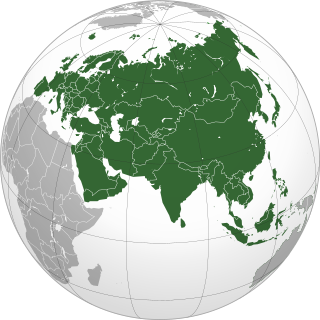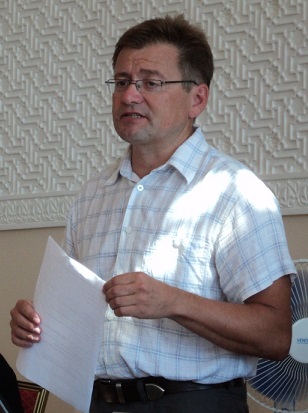Related Research Articles

Central Asia is a subregion of Asia that stretches from the Caspian Sea in the southwest and Eastern Europe in the northwest to Western China and Mongolia in the east, and from Afghanistan and Iran in the south to Russia in the north. It includes Kazakhstan, Kyrgyzstan, Tajikistan, Turkmenistan, and Uzbekistan. The countries as a group are also colloquially referred to as the "-stans" as all have names ending with the Persian suffix "-stan" in both respective native languages and most other languages.
Slavic or Slavonicstudies, also known as Slavistics, is the academic field of area studies concerned with Slavic peoples, languages, literature, history, and culture. Originally, a Slavist or Slavicist was primarily a linguist or philologist researching Slavistics. Increasingly, historians, social scientists, and other humanists who study Slavic cultures and societies have been included in this rubric.
Soviet and communist studies, or simply Soviet studies, is the field of regional and historical studies on the Soviet Union and other communist states, as well as the history of communism and of the communist parties that existed or still exist in some form in many countries, both inside and outside the former Eastern Bloc, such as the Communist Party USA. Aspects of its historiography have attracted debates between historians on several topics, including totalitarianism and Cold War espionage.

Yuri Enohovich Bregel was one of the world's leading historians of Islamic Central Asia. He published extensively on Persian- and Turkic-language history and historiography, and on political, economic and ethnic history in Central Asia and the Muslim world. He lived in the Soviet Union (1925–1974), Israel (1974–1981), and the United States (1981–2016).
Central Asian studies is the discipline of studying the culture, history, and languages of the region of Central Asia. The roots of Central Asian studies as a social science discipline goes to 19th century Anglo-Russian Great Game. During the 19th century, Central Asia became a subject of systematical information collection and organization thanks to the numerous travels made by British and Russian agents, soldiers, scholars into the region. After the collapse of the Soviet Union, interest in the field increased considerably. Central Asian studies in contemporary times is represented by a plethora of prominent scholars, institutions and academic programs throughout the world.

The Association for Slavic, East European, and Eurasian Studies (ASEEES) is a scholarly society "dedicated to the advancement of knowledge about Central Asia, the Caucasus, Russia, and Eastern Europe in regional and global contexts." The ASEEES supports teaching, research, and publication relating to the peoples and territories within this area.
The Heldt Prize is a literary award from the Association for Women in Slavic Studies named in honor of Barbara Heldt. The award has been given variously in the following categories:
Wayne S. Vucinich was an American historian. Following World War II, he was one of the founders of Russian, Slavic, East European and Byzantine studies at Stanford University, where he spent his entire academic career.

Eurasia is the largest continental area on Earth, comprising all of Europe and Asia. According to some geographers, physiographically, Eurasia is a single continent. The concepts of Europe and Asia as distinct continents date back to antiquity, but their borders have historically been subject to change, for example to the ancient Greeks Asia originally included Africa but they classified Europe as separate land. Eurasia is connected to Africa at the Suez Canal, and the two are sometimes combined to describe the largest contiguous landmass on Earth, Afro-Eurasia.
Patricia Kennedy Grimsted is a historian focused on the dispossession and restitution of cultural materials during and after World War II. She is a leading authority on archives in the former Soviet Union and its successor states.

Vladislav Martinovich Zubok is professor of international history at the London School of Economics and a Head of the Сold War Studies Programme in the Department of International History. Zubok is a specialist in the history of the Cold War and 20th century Russia, who wrote such books as A Failed Empire: the Soviet Union in the Cold War from Stalin to Gorbachev (2007) and Zhivago’s Children: the Last Russian Intelligentsia (2009).
This is a select bibliography of post-World War II English language books and journal articles about the Revolutionary and Civil War era of Russian (Soviet) history. The sections "General surveys" and "Biographies" contain books; other sections contain both books and journal articles. Book entries may have references to reviews published in English language academic journals or major newspapers when these could be considered helpful. Additional bibliographies can be found in many of the book-length works listed below; see Further reading for several book and chapter length bibliographies. The External links section contains entries for publicly available select bibliographies from universities.
This is a select bibliography of post-World War II English-language books and journal articles about Stalinism and the Stalinist era of Soviet history. Book entries have references to journal reviews about them when helpful and available. Additional bibliographies can be found in many of the book-length works listed below.
This is a select bibliography of English language books and journal articles about the post-Stalinist era of Soviet history. A brief selection of English translations of primary sources is included. The sections "General surveys" and "Biographies" contain books; other sections contain both books and journal articles. Book entries have references to journal articles and reviews about them when helpful. Additional bibliographies can be found in many of the book-length works listed below; see Further reading for several book and chapter-length bibliographies. The External links section contains entries for publicly available select bibliographies from universities.

Timothy James Colton is a Canadian-American political scientist and historian currently serving as the chair of The Harvard Academy for International and Area Studies, housed at the Weatherhead Center for International Affairs at Harvard University. Dr. Colton is the Morris and Anna Feldberg Professor of Government and Russian Studies. His academic work and interests are in Russian and post-Soviet politics. He is currently an editorial board member for World Politics and Post-Soviet Affairs. He has been a fellow of the American Academy of Arts and Sciences since 2011. He is the brother of former CBC Radio Washington, D.C. correspondent, Michael Colton.

This is a select bibliography of English-language books and journal articles about the history of Ukraine. Book entries have references to journal reviews about them when helpful and available. Additional bibliographies can be found in many of the book-length works listed below. See the bibliography section for several additional book and chapter-length bibliographies from academic publishers and online bibliographies from historical associations and academic institutions.
This is a select bibliography of English language books and journal articles about the history of Russia and its empire from 1991 to present. It specifically excludes topics related to the Dissolution of the Soviet Union; see Bibliography of the Post Stalinist Soviet Union for information on this subject. This bibliography is restricted to works about Russian history, and specifically excludes items such modern travel logs and guide books, popular culture, etc.

This is a select bibliography of English language books and journal articles about the history of Central Asia. A brief selection of English translations of primary sources is included. Book entries have references to journal articles and reviews about them when helpful. Additional bibliographies can be found in many of the book-length works listed below; see Further reading for several book and chapter-length bibliographies.
This is a select bibliography of English language books and journal articles about the history of Belarus and Byelorussia. A brief selection of English translations of primary sources is included. Book entries have references to journal articles and reviews about them when helpful. Additional bibliographies can be found in many of the book-length works listed below. The External links section contains entries for publicly available select bibliographies from universities.